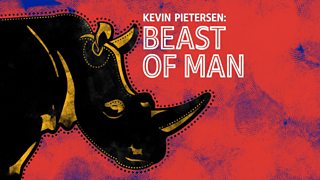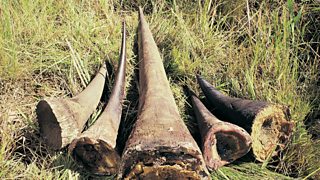Why are rhinos being killed?

In episode one of Beast of Man, we learn about the plight of the South African rhino. According to conservation charity , 1,000 rhinos were killed each year in South Africa between 2013 and 2017.
Why? Because of the value of their horn.
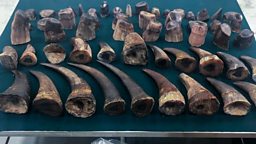
Rhino horn is reportedly worth more than gold on the black market.
According to Save the Rhino International, it is
If there is a bad infection and a high fever, or blood clots and bleeding, then they use rhino horn"Doris Rathgeber, Traditional Chinese Medicine practitioner
The charity says China and Vietnam are estimated to be the biggest consumers of rhino horn – because of various beliefs around its medicinal qualities and its value as a status symbol.
Let’s look first at China.
Doris Rathgeber is a traditional Chinese medicine practitioner based in Shanghai. She explained what the perceived medicinal properties of rhino horn are: "Rhino horn is said to be bitter, salty and cold. It is there to cool down the body. So, if there is a bad infection and a high fever, or blood clots and bleeding, then they use rhino horn. It’s to detox."
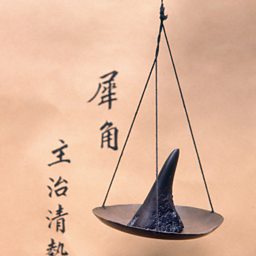
Grace Ge Gabriel is the regional director in Asia for IFAW, the International Fund for Animal Welfare.
Carvings from rhino horn [are] used to demonstrate status and define wealth"Grace Ge Gabriel, Regional Director in Asia for IFAW,
"Rhino horn has traditionally been used for its medicinal value," she said.
"But around 2005 to 2011, rhino horn was increasingly coveted as a collectible item, as an investment, or for the arts and rhino horn carving.
"Carvings from rhino horn or elephant ivory are used for giving gifts to court business favour or political favour.
"It is used to demonstrate status and define wealth, that's replacing rhino horn’s value as a medicine."
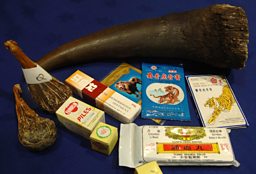
What about Vietnam?
Rhino horn consumers... think that rhino horn can help to reduce a hangover, to detoxify the body"Nam, PhD fellow
Vu Hoai Nam Dang is Vietnamese. He is a PhD fellow studying in Copenhagen at the moment.
He has been researching what he calls ‘consumer behaviour’ around rhino horn – in other words, who is using rhino horn in Vietnam and why.
"When I interview rhino horn consumers, many of them think that rhino horn can help to reduce a hangover, to detoxify the body," he said.
"Businessmen give it as a gift, use it for themselves and give it to their partners and Government leaders.
"When we have a party with our business partners, after we have a lot of drink, we offer rhino horn powder to other members of the party, we share it with each other.
"It’s one of the ways we strengthen our relationships with each other and build economic and political relations. It is also the social pleasure of being together. Rhino horn is part of the game."

"In Vietnam we have a different set of values. For example, you care about conservation and nature, you care about saving species, saving the rhino.
"But in Vietnam we care about our family members, we care about our network, our friends, our business partners."
The rhino horn is ground up into a powder and sprinkled into water to be drunk at private clubs and parties - Nam says these consumers are usually middle-aged businessmen.
In Vietnam it is also used by some people to help reduce high fever – so parents might keep some on the shelf just in case it’s needed.
This idea of rhino horn being able to reduce body heat has been around for hundreds of years in traditional Vietnamese medicine, similar to in China.
But for some, it’s also seen as a cure for cancer. Nam says that in Vietnam, if one of your family members has a serious illness, rhino horn is commonly used.
The theory being that once modern medicine has failed, family members will try anything and everything to save their loved ones.

But how are these people getting their hands on rhino horn in the first place?
That’s where poaching and international criminal networks come in.
Everyone we’ve spoken to whilst making the podcast says corruption is "rife".
Poaching syndicates will often target poachers who don’t have any income and offer them financial rewards for tracking and/or shooting rhino.
Often, because they need to be quick to avoid getting caught, they saw off the rhino horn whilst the animal is still alive and leave it to bleed to death.
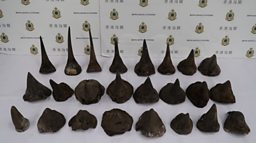
These horns are then transported through a network of local contacts to either ports, airports or even local fishermen for transportation overseas.
They may go directly to the 'demand countries', or they may follow an overland route through other Asian countries like Laos and Cambodia first.
And if you think the UK isn’t involved, think again. According to Save the Rhino, it’s likely smugglers bring rhino horn – often in small amounts carried on their person.
Even a small amount can be worth tens of thousands of pounds.

Will anything stop them?
Alongside stricter law enforcement, so-called ‘demand reduction programmes’ are taking place in countries like China and Vietnam.
These programmes use a range of tactics to try and change people’s attitudes towards rhino horn – for example, through raising awareness that their consumption means the death of an animal, or through trying to change the social status of rhino horn and ivory.
In other words, to try and make it ‘not cool anymore’. But the conservationists we spoke to are worried it will take a generation to change attitudes – time that the rhino might not have.
Want to hear more? Download the podcast
-
![]()
Trailer: Kevin Pietersen: Beast Of Man
The rhino. An icon, all but extinct. A maverick who never backs down says he’ll save them. It’s raw. It’s war.
